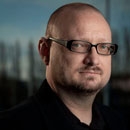What We Do
 Jamais Cascio
Jamais Cascio
Distinguished Fellow
Selected by Foreign Policy magazine as one of their Top 100 Global Thinkers, IFTF Research Fellow Jamais Cascio writes about the intersection of emerging technologies, environmental dilemmas, and cultural transformation, specializing in the design and creation of plausible scenarios of the future. His work focuses on the importance of long-term, systemic thinking, emphasizing the power of openness, transparency and flexibility as catalysts for building a more resilient society.
Cascio's work appears in publications as diverse as Metropolis, the Atlantic Monthly, The Wall Street Journal, and Foreign Policy. He has been featured in multiple television programs discussing foresight and environmental issues, including National Geographic Television's SIX DEGREES, its 2008 documentary on the effects of global warming, the History Channel's SCIENCE IMPOSSIBLE, its 2009 series on emerging technologies, and the 2010 Canadian Broadcasting Company documentary, SURVIVING THE FUTURE.
Cascio speaks about future possibilities around the world, at a variety of venues. Recent appearances include Futuro e Sostanabilita 2010 in Rome, the Guardian Activate Summit in London, and Social Business Edge in New York. He was a featured speaker at the TED 2006 conference, "The Future We Will Create," in Monterey, California.
In early 2009, he released his first book, Hacking the Earth: Understanding the Consequences of Geoengineering. Subsequently, he served as technical advisor for the Australian Broadcasting Company's 2010 alternate reality game about geoengineering, BLUEBIRD. In late 2010, he was invited to present on the subject at the National Academy of Sciences in Washington, DC.
Cascio has worked in the field of scenario development for over a decade, and in 2010 was named a Research Fellow at the Institute for the Future, where he is a primary contributor to their annual Ten-Year Forecast program. After several years as technology specialist at scenario planning pioneer Global Business Network, he went on to craft a wide array of scenarios on topics including energy (for an industry think tank), nuclear proliferation (for a political research non-profit), and sustainable development (for a multi-client project). Cascio is also a Senior Fellow at the Institute for Ethics and Emerging Technologies.
In 2007, his work on calculating the carbon footprint of cheeseburgers went viral, appearing in dozens of newspapers and magazines, multiple radio programs, hundreds of websites, and even as part of a museum exhibit. Increasingly, the cheeseburger has become an icon of the surprising carbon impact of everyday life.
In 2003, he co-founded WorldChanging.com, the award-winning website dedicated to finding and calling attention to models, tools and ideas for building a "bright green" future. In his time at WorldChanging, Cascio wrote the plurality of the site's content, covering topics including urban design, climate science, renewable energy, open source models, emerging technologies, social networks, "leapfrog" global development, and much more. In March, 2006, he started Open the Future as his online home.
Cascio has also applied his scenario development skills in the entertainment industry, advising multiple television and film projects, and designing several well-received science fiction game settings, including Transhuman Space: Broken Dreams (speculating on the future of the developing world) and Transhuman Space: Toxic Memes (examining future popular culture and political movements).



